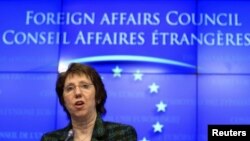Since 2006, the United Nations Security Council has imposed four rounds of legally-binding sanctions on Iran for its refusal to comply with its international nuclear obligations. Concerns deepened after the International Atomic Energy Agency in its most recent report in November said that Iran has engaged in activities aimed at developing a nuclear explosive device.
In the toughest steps it has taken so far involving Iran, the 27-member European Union has agreed to ban imports of Iranian crude oil and petroleum products; freeze the assets of the Iranian central bank; and take additional action against Iran’s energy, financial, and transport sectors.
All new oil contracts with Iran are banned immediately; existing contracts can be fulfilled until July 1. UN Security Council Resolution 1929, adopted in 2010, noted the potential connection between revenues derived from Iran’s energy sector and the funding of Iran’s proliferation-sensitive nuclear activities.
The new measures fall in the context of increased international pressure on Iran, and the United States welcomed them.
In their joint statement, Secretary of State Hillary Clinton and Treasury Secretary Timothy Geithner said the new EU sanctions “are another strong step in the international effort to dramatically increase the pressure on Iran. They are consistent with steps the U.S. previously has taken and with new U.S. sanctions on Iran that the President [Barack Obama] signed into law on December 31st. . . .The United States and our international partners are committed to preventing Iran from acquiring nuclear weapons. That is why we have pursued a dual-track policy that puts pressure on Iran to engage seriously in discussions with the international community on its nuclear program.”
And, in a statement on January 23, the President reaffirmed, “These sanctions demonstrate once more the unity of the international community in addressing the serious threat presented by Iran’s nuclear program. . . .We will continue to increase the pressure unless Iran acts to change course and comply with its international obligations.”
EU Bans Imports Of Iranian Oil

The new measures fall in the context of increased international pressure on Iran.



